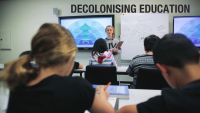Why decolonising education movement matters for peacebuilding and consociational democracy
It has been just over three years since the bucket of poo started what we now know as decolonising university movement. On 9 March 2015 Chumani Maxwele travelled by minibus to Khayelitsha, black township just outside Cape Town, and picked up one of the plastic boxes full of human faeces. The boxes were left on the kerb to be collected by the municipality in this poor black neighbourhood of dark and claustrophobic shacks. Maxwele brought the box to the University of Cape Town campus, where he enrolled as political science student few years prior, and threw its contents onto the statue of British colonialist Cecil John Rhodes. This act kick started the Rhodes Must Fall Movement that spearheaded a wider movement to decolonise education, first nationally then internationally.
Still going strong today, the movement takes many forms but overall it demands that universities acknowledge, reflect upon and rectify structural and epistemological consequences of colonialism. The movement aims for a transformation in education via: i) the interrogation of the nature of knowledge propagated through the higher education; ii) decentralisation of Western intellectual tradition, ii) exposition and eradication of still present institutional racism and iii) intensification of diversity within student and faculty populations.
While movement’s intellectual foundations can be traced back to 1990s and the postcolonial theory project whose principal text was Edward Said’s Orientalism, it is only today that his illuminating analysis is being incorporated into the welcome, albeit still slow, institutional change.
So what can we learn from decolonisation of education movement that is relevant for peacebuilding and consociational democracy?
Education is often neglected when discussing reconciliation and peacebuilding in divided societies. Instead, peacebuilding actors are mostly focused on security issues in these areas. When education is included in peacebuilding efforts most often it is in the form of conflict resolution and/or human rights awareness training. This is an important oversight considering education’s relationship to economic, political and cultural power. The structuring of knowledge and symbol in educational institutions is intimately related to the principles of social and cultural control. Most importantly the schools are crucial sites for creation of national identity and social norms. The kinds of narratives that are being chosen as official knowledge within educational institutions tell us about what kind of society is being created.
This is very relevant in the case of Bosnia. Bosnia is a country that has fallen into what Lise Howard calls the ethnocracy trap. Ethnocracy is a political system in which political and social organisations are founded on ethnic belonging rather than individual choice. Countries whose political parties are based foremost on ethnic interest, where ethic quotas determine the key posts, and where state institutions are segmented by ethnic group, often fall into the ethnocracy trap where it is impossible to move past ethnic divisions. Furthermore, these societies became paralysed by ethnoreligious factions. Following the institutionalisation and constitutionalisation of extreme consociationalism, which Dayton Agreement introduced into the country, Bosnia became an ethnocracy and has since fallen into the trap.
This is particularly evident in education. As an institution it is based upon segregation. Not only are there separate, or fully segregated, schools for separate ethnicities, but there are separate textbooks and separate curricula to match group ‘identities’. My preliminary data analysis of history and geography textbooks in Bosnia for the academic years of 2016/17 and 2017/18 shows significant inconsistencies in reporting of historical events, omissions and in some cases extreme acts of ‘othering’. Furthermore, the analysis of documentary materials related to Bosnian education system shows hugely politicised environment in which student textbooks are written, discussed and disseminated. Governmental guidelines in Bosnia, represented in the Federation by FMON insist that at least 70% of student textbooks have ‘common core’ when it comes to the content. This means that 30% of content is being left to the ‘local context’. This local context means that decisions on what type of content to include in the textbook are being left to the Cantonal Ministries . There are ten Ministries in the Federation of Bosnia and Herzegovina. The type of textbook distributed will therefore depends on the local population composition. In addition, Republika Srpska has its own ministry, its own ethnicised curricula and does not acknowledge or cooperates with Federation on Bosnia with regard to education.
Effectively curriculum in the whole country of Bosnia and Herzegovina is being colonised by ethnic divisions, extreme ethnic narratives and new post-Dayton nationalism. This type of education produces and re-produces structural inequalities in Bosnia. Furthermore, this type of a curriculum posits certain narratives over others and results in discrimination, lack of diversity, and alienation amongst student population. This is precisely what decolonisation of education movement fights against in their context.
Bosnian students, like South African students, know this. In fact, Bosnian students are on the streets already. They are raising their voices against divisions in education and segregated curriculum. The movement started just over a year ago in Bosnian town of Jajce when students successfully reversed local government plans for further segregation. They have continued to protest since and their final aim is to end segregated education in the entire country. They are struggling for the way out of ethnicity trap and asking for a different future. We should listen.

